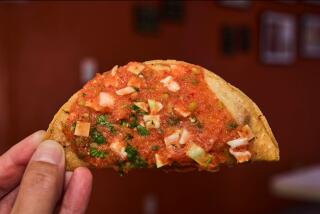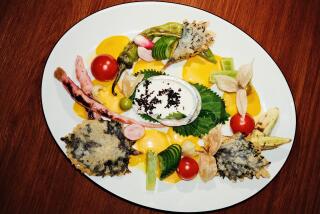HOOKED ON FRESH FISH
SEATTLE — “If the fishing industry was doing the job right, I wouldn’t have a business,” says Jon Rowley. But he does have a business--and one that is growing fast.
Rowley, who has been called “the fish missionary” by Julia Child, is a consultant to people who care about the quality of fish. It all started five years ago when the former fisherman (Rowley was a commercial fisherman in Alaska for eight years) went to one of Seattle’s finest restaurants for dinner.
“The waiter described the fish they were serving, and talked about how it had been caught. It sounded great. Then the fish came to the table, and it just didn’t meet the rap.” Rowley, a large man who can wax poetic when discussing fish, has been known to say that good fish is “magic when you eat it.” He considers bad fish a personal affront. “Who’s in charge here?” he demanded. The owner of the restaurant came over to the table. At 6 a.m. the next day they were still talking.
“The problem,” says Rowley, “is that the government has only two standards for seafood. Wholesome and unwholesome.” Basically that means that if the fish won’t make you sick, it can legally be sold.
Rowley decided to set some standards of his own--for each species of fish. Then, with the owner of the restaurant, Robert Rosselini, he started a new business dedicated to procuring good seafood.
There were problems--lots of them.
Rowley found that he couldn’t work within the normal system of distribution, and so he went around it. He designed a program for the handling of fish on the boats, persuaded a few fishermen to follow it and paid them a premium price. He went down to the docks every day and personally picked the fish. He demanded that all the fish be caught with hook and line, bled immediately, gutted, and carefully laid by hand into boxes filled with ice. These fresh fish were an instant hit with the restaurant’s patrons.
Then other restaurants began to clamor for good fish, and the little business grew too fast. The Health Department refused to license the operation. (The director admitted that Rowley’s fish was remarkably fresh, but said, “ You can’t just let anybody run around town selling fish off the tailgate of a truck.”)
Rowley was practically smuggling fish in the back door of restaurants, but more and more of them wanted his wares. “Restaurants found that when they started paying attention to the quality of fish they were serving, their business went up and they made more money. I really didn’t want to be in the wholesale business, so I decided to sell what I know instead.”
Two years ago Rowley and his wife, Anne, started Fish Works. “I have never tried to convince anyone to use my services,” says Rowley, but he has almost single-handedly improved the quality of fish that Seattle eats. And it is impressive; go into any of a couple of dozen restaurants, places that look like ordinary tourist joints, and you find superlative seafood. A local fish like black cod (often sold in the supermarket as the despised “butterfish”), is an extraordinary treat when it is really fresh. In a week of eating in Seattle, I never had less than wonderful fish. “Well,” says Rowley, “people that I’ve worked with for a while can look at a fish and tell you its entire history: How it was caught, what happened to it on the deck of the boat, how it was transported, what the colors mean, what the different bruises mean--they all tell a story. Once they’ve learned quality standards, restaurants know how to buy really high-grade fish.”
There’s another part to this equation: Once customers have tasted this fish, they begin to want it at home.
“High-profile restaurants are a good place to get products off the ground,” says Rowley. And so when the government gave him a grant to help the ailing albacore industry, Rowley decided to go to restaurants again. “The tuna canners on the West Coast have closed down,” says Rowley, “and the production of that entire fishery went into cans. Only recently has a little dribble of it gone into the market in its natural form. It’s a good fish, but the wholesalers won’t carry it because there isn’t a market for it.” Rowley intends to get restaurants interested in albacore, in hopes that the public will follow along.
If what’s happened in Seattle is any indication, the public very likely will. The demand for the sort of fish now served in Seattle restaurants is so strong that Rowley’s most recent customers have all been supermarkets. He is very strict with them, but the stores have found that it pays off: One of Rowley’s supermarkets now sells more fish than beef. “The government,” says Rowley, “says they are the only store in the country who do.” If Jon Rowley has his way, that statistic will be changing soon.
More to Read
Sign up for Essential California
The most important California stories and recommendations in your inbox every morning.
You may occasionally receive promotional content from the Los Angeles Times.










